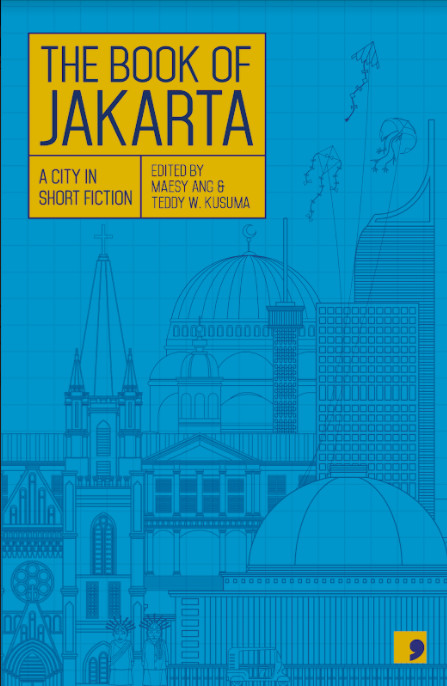Popular Reads
Top Results
Can't find what you're looking for?
View all search resultsPopular Reads
Top Results
Can't find what you're looking for?
View all search resultsUK publisher to launch portraits of Jakarta in fiction anthology
UK-based publisher Comma Press is set to publish an anthology of short stories all based in Jakarta, as a part of its critically acclaimed Reading the City series.
Change text size
Gift Premium Articles
to Anyone
E
very person who has been lucky enough to taste chaotic yet enchanting Jakarta would agree that the city is crammed with interesting stories. Open your window anywhere in the city and you will immediately find romance, horror, comedy, drama or anything in between waiting to be written down.
UK-based publisher Comma Press has seized this opportunity by publishing an anthology of short stories with Jakarta as the setting, as part of its critically acclaimed Reading the City series.
The Book of Jakarta: A City in Short Fiction features short stories from acclaimed homegrown writers Sabda Armandio Alif, Hanna Fransisca, Cyntha Hariadi, Afrizal Malna, Dewi Kharisma, Michellia, Ratri Ninditya, Yusi Avianto Pareanom, utiuts, Ben Sohib and Ziggy Zezsyazeoviennazabrizkie.
The cover of 'The Book of Jakarta: A City in Short Fiction'. (Courtesy of/Comma Press)
Maesy Ang and Teddy W. Kusuma, founders of independent book shop and publisher POST in Pasar Santa traditional market, South Jakarta, served as editors.
The 10 short stories, translated into English for the first time, are curated to give readers a literary portrait of the ever-changing landscape of Indonesia’s capital.
One of the authors, the award-winning Ziggy, said her short story was inspired by happy memories she had as a child mixed with a horror-filled incident she encountered as an adult when she visited the city.
“When I was a little girl, I remembered Jakarta as a place filled with happiness and games,” the Lampung-born writer told The Jakarta Post. “However, on the first day I visited my sister when she already settled in Jakarta, I encountered a criminal case of murder-breaking and entering-arson happening at a nearby house. That incident altered how I saw Jakarta: gruesome.”
Ziggy’s recipe for fun childhood memories with a hint of horror resulted in a quirky tale about a gang of elderly women who decide to commit mass suicide at the city’s amusement park, Dunia Fantasi, when the park’s beloved attraction, The Doll Palace, is shut down.
Armandio or Dio, on the other hand, captures the city from the eyes of two buskers in the busy corner of Palmerah, West Jakarta, during the suspenseful minutes of the September 2019 protest.
“I want to tell a story that shows […] that the fear of being arrested or beaten by police officers during the rally is true, and it could happen to anyone. And that jokes about 'espionage' are not funny, because the fear is real,” he told the Post.
Street buskers have the perfect eyes to tell the story, Dio said.
“[They] are familiar with authority figures, such as the Public Order Agency [SatPol PP] and the traffic police officers,” he said.
Dio said that Gembok and Yuli, the buskers he wrote about, were inspired by real-life friends of his, buskers who didn't fit the apolitical stereotypes.
“These friends of mine busk along the Blok M - Ciledug route. Both have a lot of opinions about Jakarta, have strong cynicism toward the middle class and what they have in mind is valid,” Dio said.
The translator for Dio's story, Rara Rizal, said that translating the short story was a fun process, especially as she knew the writer as a dear friend.
“We are involved in the same translator’s collective and have collaborated several times before. It’s truly a wholesome experience and an honor to translate the work of a very good friend,” she said.
In translating the story, Rara refused to whitewash the local elements that occur repeatedly in the story as doing so would have betrayed the nuances.
“As a translator, I strive to challenge the notion that translation should be made palatable to the 'global reader'. Besides, most of the time global means 'white/cis/hetero/male' anyway,” she said, laughing.
“Ultimately, if there’s anything that I think of as 'very Jakarta', I either trust that anyone in the world will relate to the experience or the nuance, or I let them feel disoriented or confused by the foreign-ness, the 'Jakarta'-ness of it all,” she added.
This affected her decision on whether to come up with an English version of an Indonesian dish (nasi goreng into fried rice, pempek into fishcake, etc.), or whether to leave certain words untranslated and not italicized.
“In this short story I used 'warung', not 'kiosk' or 'food stall' or — heaven forbid, warung in italics,” she said, rolling her eyes. “The word 'warung' is such a part of our everyday life in Jakarta. I love the ambiguity of the word: you eat at warung, hang out at warung and buy cigarettes and daily supplies at warung! So, let the 'global reader' experience that too in the writing and not turn it into something… English.”
Translator Syarafina Vidyadhana, known as Avi, agreed that in translating she was not trying to reach the assumed “global” audience.
“At the end of the day, if I did a good job, the feeling or experience should be universal enough for people to relate to. But as for the Jakarta-ness of it all, I believe it should remain specific and unique to the city,” she said. “It is, after all, a story about Jakarta and the whole book is about Jakarta!”
Translating fiction was a breath of fresh air for Avi, as in daily life she translates dry texts such as reports, research and policy papers.
“There are many ways to choose when translating imagery, metaphors or similes and it is the translator’s task to find and try all those ways until finally choosing the strongest one, the one that fits best with the author’s vision in the source text,” she said. “Sometimes the process involves staring at a blank page for hours, sometimes it's through rigorous research, sometimes it just comes to you like a dream.”
The Reading the City series has brought original stories from Tokyo, Gaza, Cairo, Istanbul and many more since 2006. Each anthology selects 10 authors from those specific cities to convey the social, historical or political essence of the local natives to the global audience.
The Book of Jakarta: A City in Short Fiction is published by Comma Press on Dec. 10 and is available to purchase here. (wng)












